- Disneyland® Paris Tickets
- Eiffel Tower Tickets
- Louvre Museum Tickets
- Paris Catacombs Tour & Tickets
- Versailles Tickets
- Notre-Dame Paris Tickets
- Orsay Museum Tickets
- Paris Pantheon Tickets
- Arc De Triomphe Tickets
- Opera Garnier Paris Tickets
- Big Bus Paris Hop-on Hop-off Tours
- Parc Astérix Paris Tickets
- Sainte Chapelle Tickets
- Les Invalides Tickets
- Eurail Passes
- Musee de l'Orangerie Tickets
The Ultimate Guide to Getting Around Paris | Paris Public Transport, Travel Apps, Tips & More

Getting Around Paris

Metro
From € 1.90
Good For: Long, affordable inter-city commute
Timings: Sun to Thu - 5:30 a.m. to 12:40 a.m. | Fri & Sat - 5 a.m. to 1:40 p.m.
Frequency: Every 4 - 5 minutes
Metro is the most connected and popular means of public transport in Paris. The Paris metro, which is mostly underground, runs across 16 lines covering a 214 km network connecting over 300 stations.
- The Paris metro network consists of 16 lines marked by different colors and numbers.
- Most stations have a large metro map at the entrance and at the platform with details of the train and route you need to take.
- The name of the terminals on each line will tell you the direction of the metro. This is important to note as you cannot switch directions from within the station in between journeys. You will need to step out and get a new ticket and enter to do so.
- You can use a T+ ticket or the Paris Visite Card to ride on the metro.
- A single journey ticket to anywhere in the city costs € 1.90, whereas 10 tickets cost € 14.90.

RER
From: € 1.90
Good For: Faster commute & regional travel
Timings: RER-A: 5:19 a.m. - 12:36 a.m. | RER-B: 4:56 a.m. - 12:15 a.m.
Frequency: Every 3 - 5 minutes to every 15 - 30 minutes, depending on the station
The RER (Réseau Express Régional) is a hybrid regional rapid transit train that goes through Paris, connecting the city to the suburbs and beyond. It mostly runs above the ground, except within Central Paris. The RER which runs across a 5-line network is faster than the metro as it has fewer stops.
- The RER train network consists of 5 lines in different colors and letters.
- RER lines A and B, operated by the RATP, run primarily within Paris whereas the other three lines, driven by the SNCF, run further out of the city.
- The RER network connects over 250 stations and has several connections with Paris Metro.
- RER trains accept T+ tickets and the Paris Visite Cards, charging € 1.90 for a single trip and € 14.90 for 10 trips within the city.
- The ticket prices for RER trains that take you outside the city depend on the distance covered.
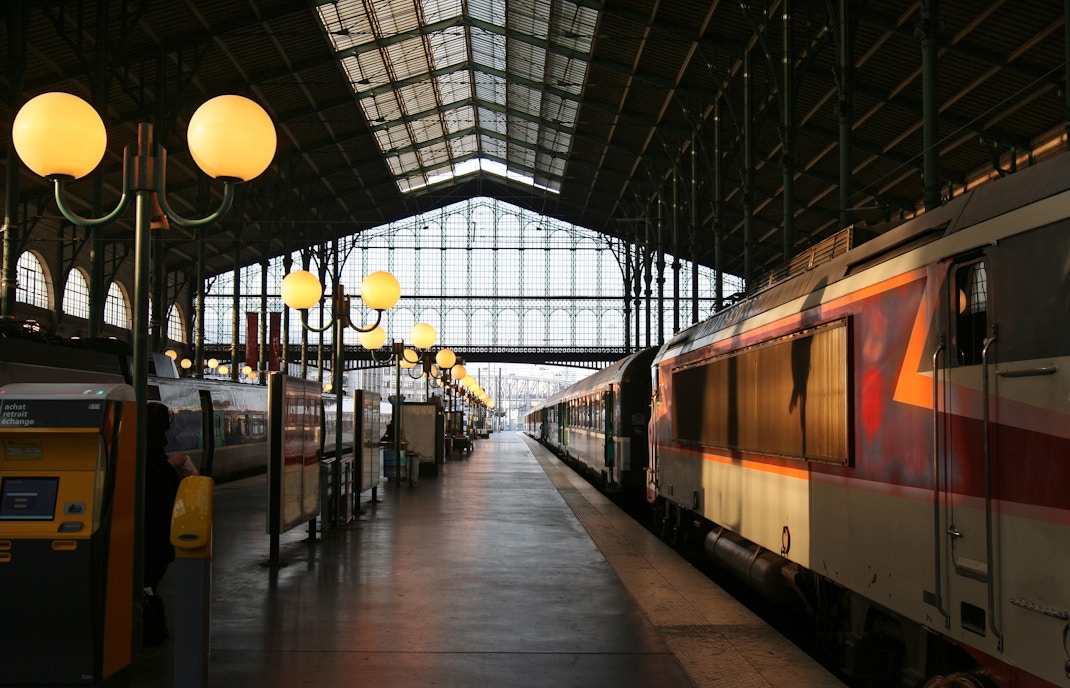
Transilien
From: € 1.90
Good For: Affordable regional commute
Timings: Depends on the line and day of the week (find here)
Frequency: Depends on the line and day of the week (find here)
Transilien trains are a type of suburban train that connect the main stations in Paris (Nord, Est, Lyon, Austerlitz, Montparnasse, and Saint-Lazare) to the suburbs beyond the connectivity of the RER network. This SNCF-operated train network lets you commute across the Île-de-France region without passing through Paris city center.
- Transilien trains run along eight different lines, named H, J, K, L, N, U, P, and R.
- The Transilien network covers almost 400 stations across the Île-de-France region.
- Transilien train lines are often connected with RER C, D, and E lines and tramway lines 4 and 11, at various stations.
- Tickets can be purchased through Transilien vending machines or at Transilien ticket counters at metro and RER stations.
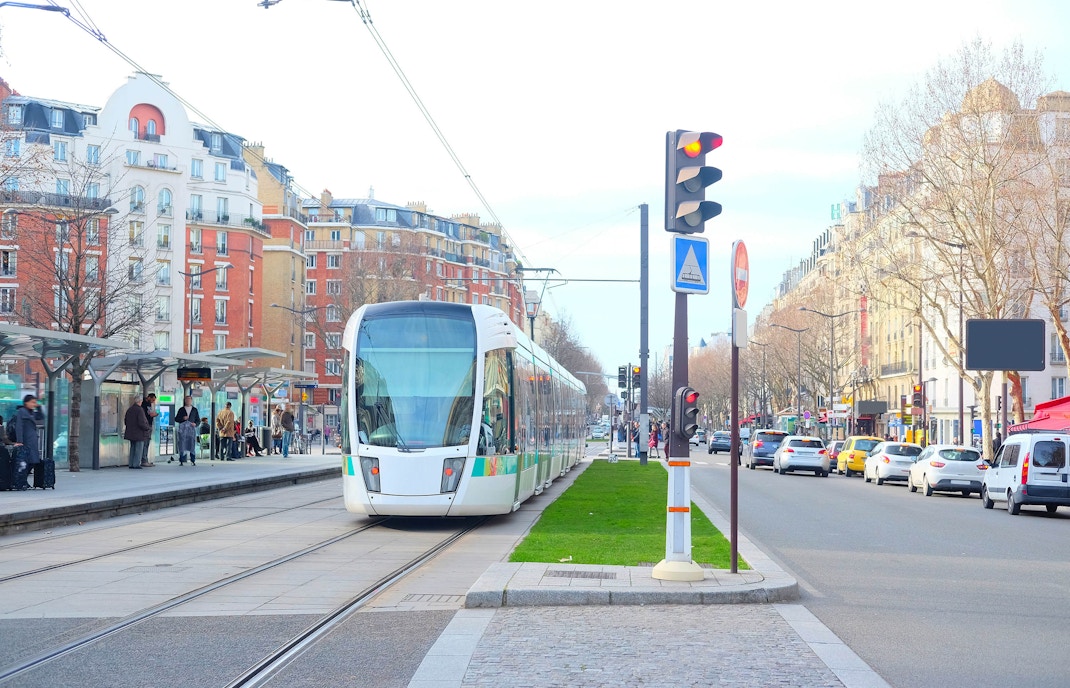
Tram
From: € 1.90
Good For: Short, affordable inter-city commute
Timings: 5:15 a.m. - 1:15 a.m.
Frequency: Every 5 - 7 minutes
Trams let you enjoy the street views like traveling in a bus, with the comfort and convenience of a train. The tramway in Paris currently has 12 lines with two more under construction. While four of these lines - T1, T2, T3, and T4 - cater along the perimeter of the city, the others run beyond the fringes.
- The tramways mostly lay along the perimeter of the city and may not connect to landmarks and city hotspots.
- Tramways within Paris start between 5:15 a.m. and 6:30 a.m. and end between 12:30 a.m. and 1:15 a.m., depending on the line.
- In the suburbs, tramway start timings vary from 4:25 a.m. to 5:50 a.m. and end timings vary from 12:30 a.m. and 2 a.m., depending on the line.
- Tram tickets s are the same as those used on the metro and the RER, available at the same prices.
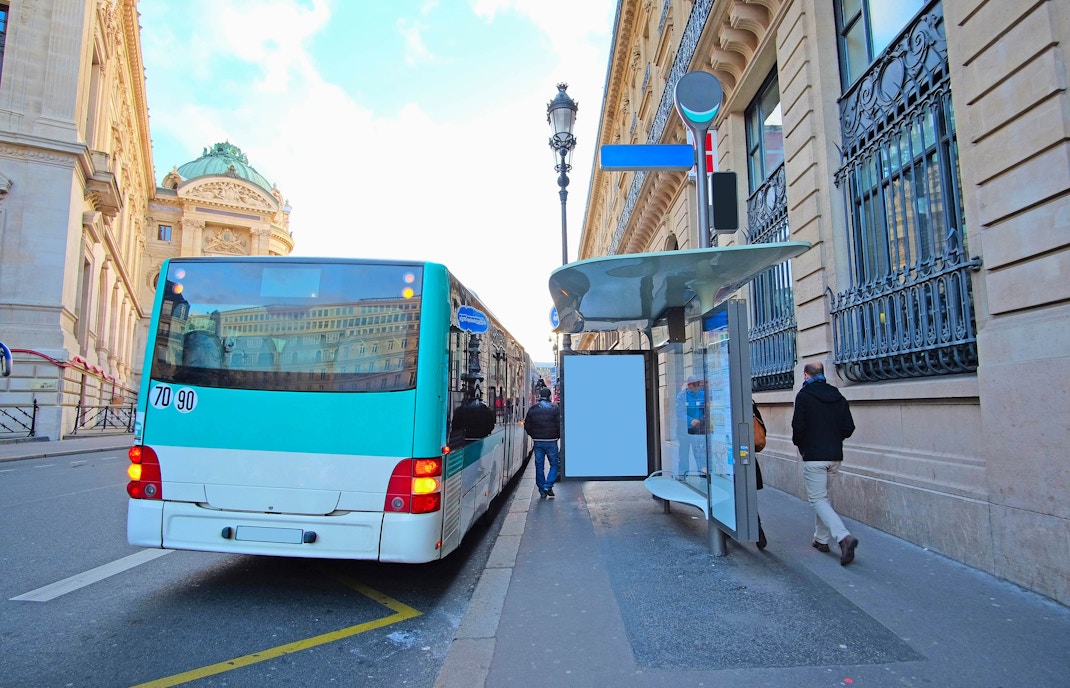
Bus
From: € 1.90
Good For: Easily accessible inter-city micro commute
Timings: 5:30 a.m. to 1:15 a.m.
Frequency: Every 10 - 15 minutes
Buses are the easiest mode of public transport to access in Paris. They also give you the added advantage of visually experiencing the city streets as you commute. Paris has a well-connected bus network of 64 lines linking hundreds of stops throughout the city. Please note that a few bus routes operate only until 8:30 p.m., and some are non-functional on Sundays and public holidays.
- Buses are the most convenient and affordable option to get to specific landmarks and interior towns in Paris.
- Buses are sometimes faster than the metro as they go through the interior of the city.
- The T+ tickets and the Paris Visite Cards used for other RATP vehicles can be used for buses too.
- You may buy the tickets at a station or a bus terminal at regular rates, or on board a bus at a slightly higher price.
- The directions of the color-coded and numbered bus lines are indicated by the station name at the end of the line.
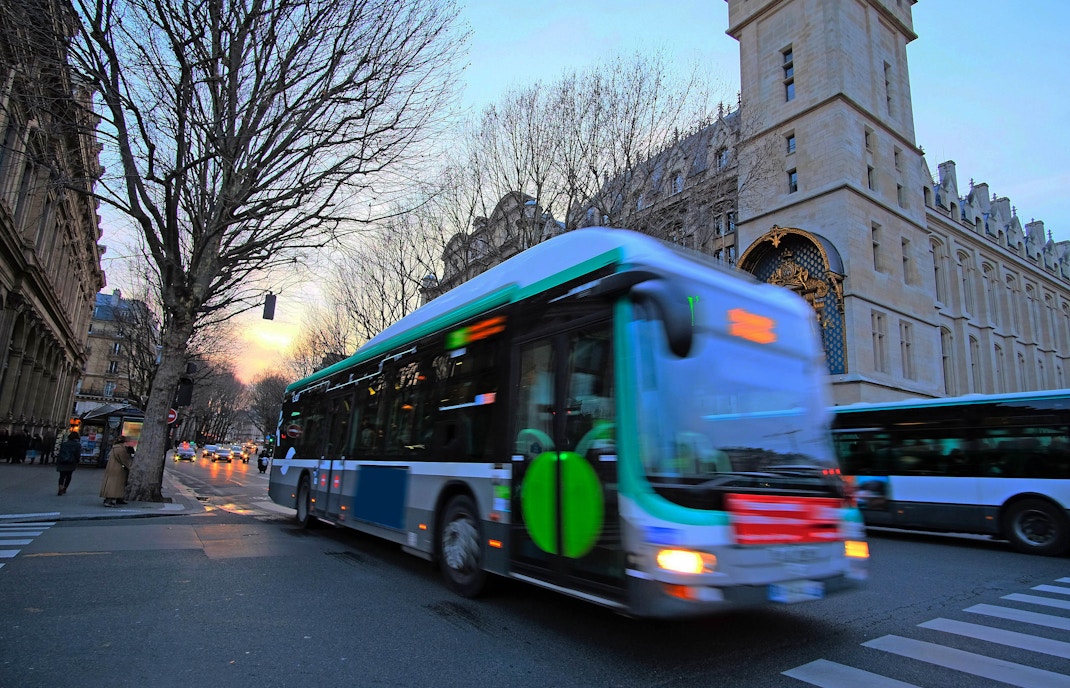
Night Bus
From: € 1.90
Good For: Late-night inter-city micro commute
Timings: 12:30 a.m. - 5:30 a.m.
Frequency: Every 5 - 10 minutes to 15 - 30 minutes, depending on the station
Late-night travel in Paris is made safe and convenient through the Noctilien - the Paris Night Bus service. These buses run along 47 lines through more than 200 cities across the city. The coaches are always under surveillance, and also have a guide on board.
- The night bus lines are indicated by an N before the number of the line.
- All RER stations are connected to the Noctilien network
- The tickets for night buses are the same as for day buses.
- Châtelet, Montparnasse, Gare de l’Est, Gare Saint-Lazare, and Gare de Lyon are the firve major night bus transfer hubs.
- If traveling tired on Noctilien lines N130 to N154, you can request the guide staff on board to wake you up when approaching the desired stop, and then take a nap.
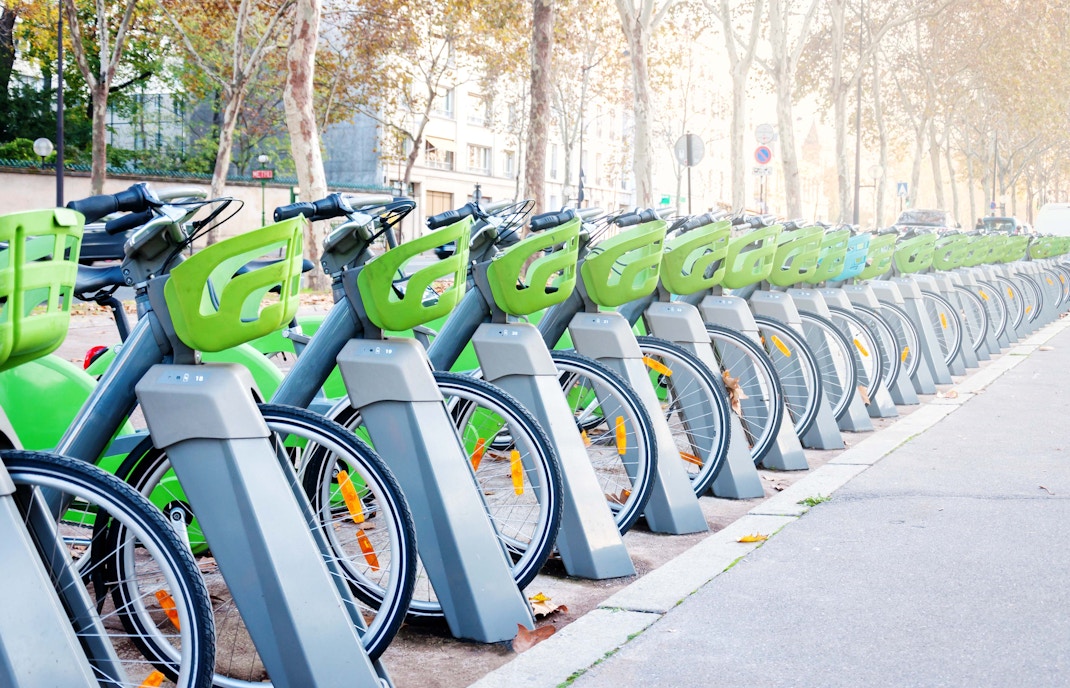
Rented Bikes
From: €3
Good For: Eco-friendly personal commute in and around the city
Timings: 24 x 7
Vélib' Métropole is a private syndicate-owned bike-sharing service in Paris that lets you rent a bike for a set journey or a fixed period of time. You need to purchase an access card to swipe on the handlebar of the bike to get it started. You can pick up a bike at one of the docking stations and return it to the docking station closest to your destination.
- Vélib' Métropole has almost 1,400 docking points in the Greater Paris area
- The Vélib' Métropole network has over 20,000 bicycles of which 40% are electric bikes.
- The blue Vélib' cycles are electric, while the green ones are mechanical.
- You can check the availability of bikes and find the closest docking stations on the Vélib' app.
- You may rent a bike for a 45-minute long trip, get a 24-hour pass, purchase a 3-day pass, or even take a year-long subscription.
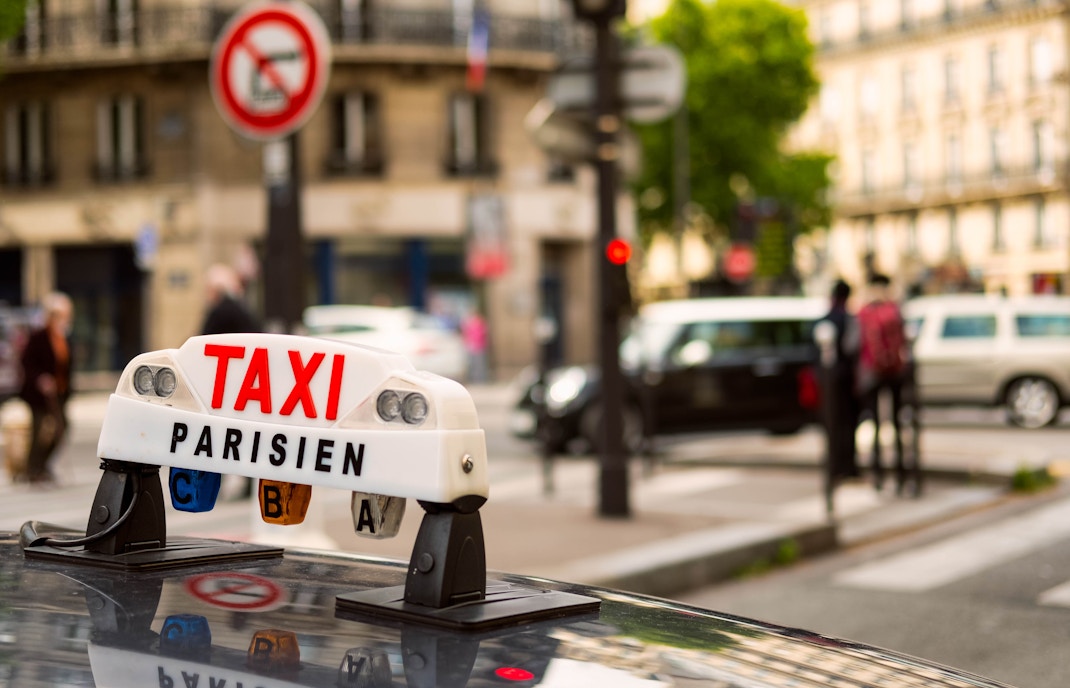
Taxi Cabs
From: € 7.10
Good For: Convenient commute, round the clock
Timings: 24 x 7
Paris has over 20,000 licensed taxi cabs on its streets 24 x 7. You can find them in various colors with the ‘Taxi Parisiens’ signage on top of the car. You may hire a taxi at one of the 500 official cab stands in the city, or wave one down on the road. You can alternatively get a cab by calling 0145303030.
- Make sure the taxi you get into has a meter in place.
- The base taxi fare is € 2.60, with a minimum service fee of € 7.10.
- From Monday to Saturday, the charge per kilometer is € 0.96 between 10 a.m. and 5 p.m. and € 1.17 after that. On Sundays between 7 a.m. and 12 a.m., the rate is € 1.21.
- On Sunday nights and public holidays, the rate per kilometer is € 1.47.
- Taxi drivers prefer getting paid in cash for short-distance trips and accept cards only for long distances.
Paris Transportation Zones
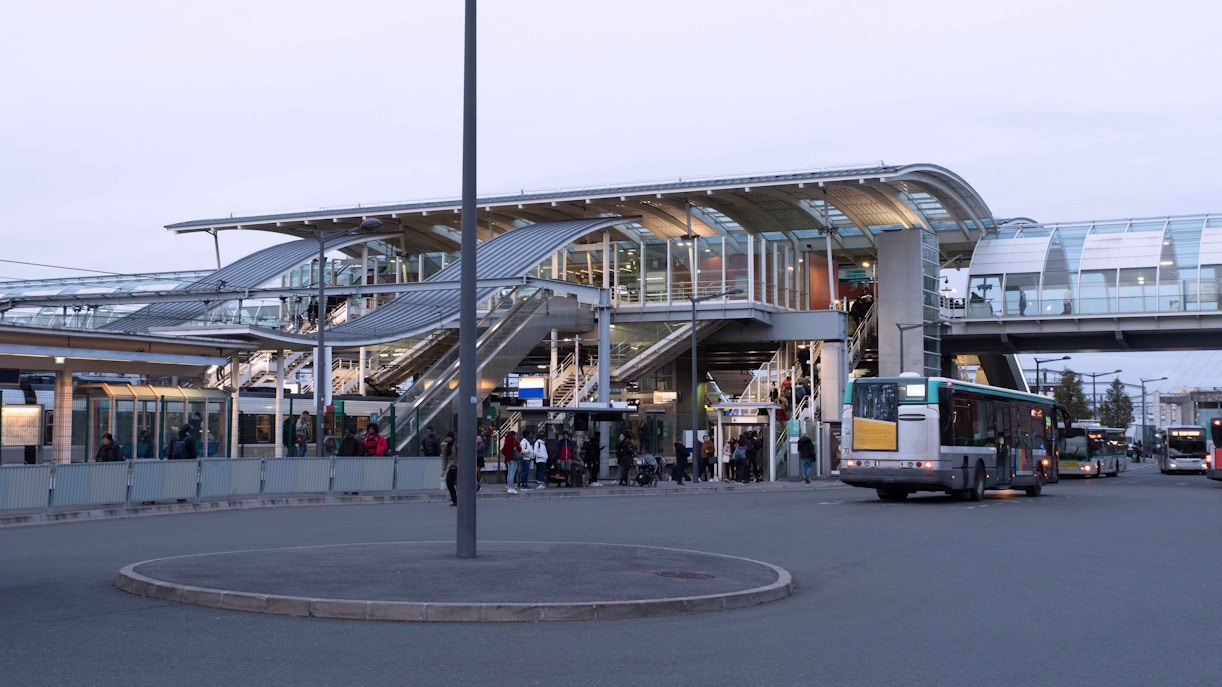
The city of Paris and its surrounding suburbs are divided into 5 zones, to measure the distance and pricing of public transport in Paris. These zones are marked on the map as circular rings starting with the city center and radially moving out towards the suburbs.
It is important to know which zones you would be crossing to reach your destination, in order to take the right ticket. All modes of public transport in Paris except the metro and taxis follow the zonal map. It is therefore advised to keep a transportation map handy while planning your itinerary and also buying your tickets.
Most of the tourist destinations and highlights in Paris like the Eiffel Tower, Louvre Museum, Notre Dame Cathedral, Arc de Triomphe, Paris Opera House, etc. are within zone 1 which is accessible by the same ticket or pass. The most visited places outside this zone include The Château of Versailles and Orly airport in zone 4, and the Charles de Gaulle Airport, Fontainebleau Palace, and Disneyland in zone 5.
Airport Connectivity in Paris
.jpg?auto=format&w=1069.6000000000001&h=687.6&q=90&fit=crop&ar=14%3A9&crop=faces)
Charles de Gaulle Airport (CDG)
RER Train: The fastest and cheapest way to get to the city from Charles de Gaulle Airport, and vice-versa, is by taking the RER train. The RER - B line connects two different terminals of the airport to the city. The trains to Paris usually leave from platforms 11 & 12 at the airport. The ticket costs about € 7 for children aged 4 - 9 and € 10 for an adult and others.
Bus: The Roissybus Service by RATP is the cheapest airport bus transfer option available between Charles de Gaulle Airport and Paris city center. The bus ticket prices at about € 11. Lines 350 and 351 of the public bus network also connect various parts of the city to Charles de Gaulle Airport, which is in zone 5.
Taxi Cab: Taxis are readily available to and from Charles de Gaulle Airport at all times, on all days. It is the most convenient mode of transport if you are traveling with a lot of luggage. They charge a flat fare of € 50 to places towards the right bank (north of the Seine) and € 55 towards the left bank (south of the Seine) from the airport.
.jpg?auto=format&w=1069.6000000000001&h=687.6&q=90&fit=crop&ar=14%3A9&crop=faces)
Orly Airport (ORY)
RER Train: The RER train is connected to Orly airport at Antony station along the RER - B line. You can take the Orlyval shuttle train from the airport to get to the station. These trains are available every 4 - 7 minutes and take about 25 - 35 minutes to reach the city. The journey costs € 13.25, including the shuttle ticket.
Bus: Taking the bus is the cheapest way to get to the city from Orly Airport. Buses numbered 183 and 285 of the public bus network connect the airport in zone 4 to the city. You can board the bus from in front of Terminal Sud and head towards Porte de Choisy station in Zone 1, which is quite central. The commute costs € 2 and takes about 50 minutes to complete.
Taxi Cab: You can commute between Orly Airport and any part of Paris in a taxi, around the clock. Taxis charge a fixed rate of € 35 to places towards the right bank (north of the Seine) and € 30 towards the left bank (south of the Seine) from the airport.
Driving in Paris
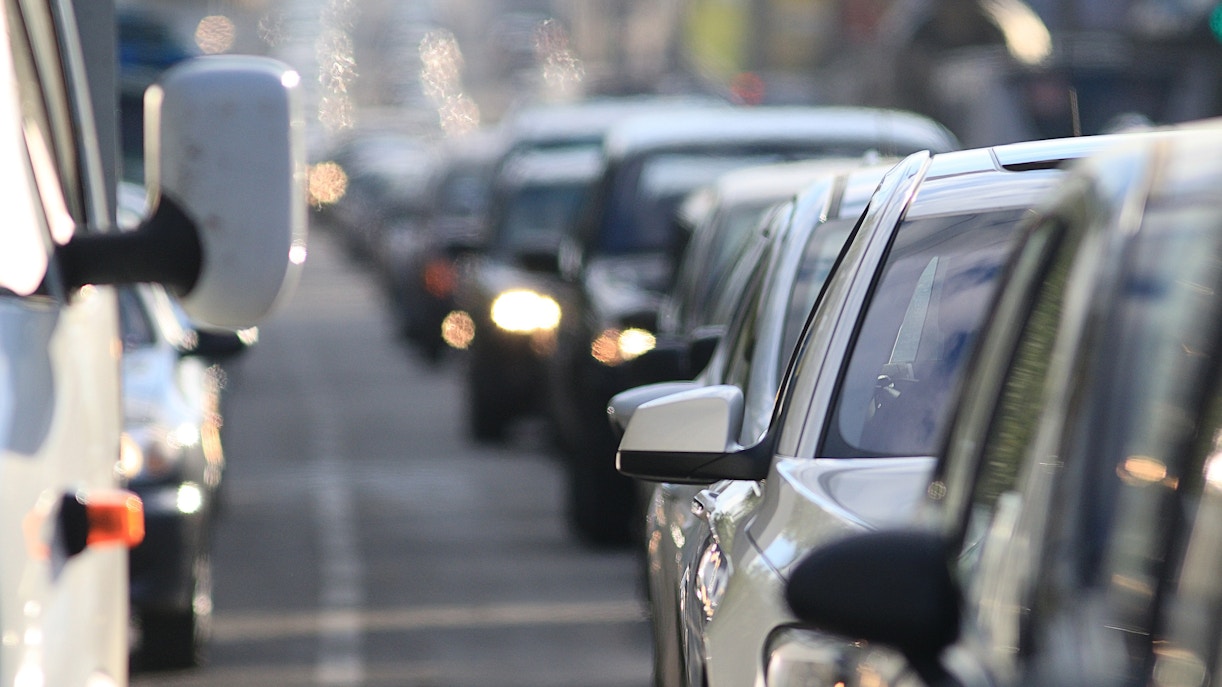
Know Before Driving in Paris
Non-residents and tourists are allowed to drive in Paris as long as they possess an international driving license. It is important to carry the license along at all times to avoid fines if asked.
International drivers above the age of 18 are also allowed to hire cars in Paris. Although, while hiring a car, make sure the rental company provides you with a warning triangle and reflective vest, which are mandatory in France.
If you choose to drive your own car in Paris, it is important to obtain a ‘Crit'Air’ badge that shows that your car adheres to anti-pollution standards enforced in certain zones of the city.
- Road Rules: When in Paris, you must drive on the right-hand side of the road, and always give way to vehicles approaching from the right.
- Speed Limit: The speed limit on interior roads within the city is 50 km/hr. On highways and freeways in and around Paris, the minimum speed on the fast lane is 80 km/hr, which is reduced to 50 km/hr in case of poor road visibility or weather conditions.
- Legal Driving age: You must be at least 18 years old to drive or rent a car in Paris.
Travel Passes in Paris
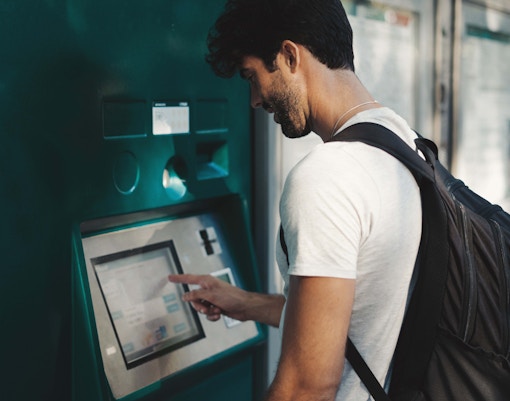
T+ Ticket
Cost: € 1.90
Valid For: 2 hours on the metro and RER | 90 minutes on bus and tram
T+ ticket is a single-journey ticket issued for all modes of public transport operated by RATP in Paris. These tickets can be purchased through vending machines at stations or on board a bus or tram (for an extra € 0.20). A single T+ ticket costs € 1.90, while a carnet of 10 tickets comes at a discounted price of € 14.90 (€ 7.45 for children under 10 years).

Carte Mobilis
Cost: Check Here >
Valid For: 1 day
Carte Mobilis is a one-day travel pass that lets you make unlimited trips on any public transport vehicle, within your selected zones in Paris. The card is valid from midnight to midnight irrespective of when it is purchased or first used. You can buy the card at any RER or metro stations, some bus stations, or registered RATP ticket retailers.

Paris Visite Travel Card
Cost: Check Here >
Valid For: 1, 2, 3, or 5 days
The Paris Visite travel card grants you unlimited use of the public transport system in Paris, for a valid period. The validity is calculated from midnight on day 1 to midnight on the last day. The travel pass can be purchased for two different zones: 1-3 (for commuting within the city center) and 1-5 (required to travel to the airports or Disneyland).

Navigo Découverte Travel Card
Cost: Check Here >
Valid For: 1 day, week, or month
The Navigo Découverte travel card offers the cardholder unlimited travel using public transport, across all zones of Paris, for a day, a whole week, or a month, as subscribed. You can purchase the plastic or electronic card and top it up with a daily, weekly, or monthly pass. Do keep in mind that a weekly pass is valid from Monday to the Sunday of the week, irrespective of when it is bought.
Must-Have Paris Travel Apps
Do’s & Don’ts While Getting around Paris
If you are an avid traveler and have traveled extensively, you might be used to the fact that every country has its own rules and regulations that must be complied with. As a tourist, it becomes your duty to respect the culture, laws, and rules of the country you are in.
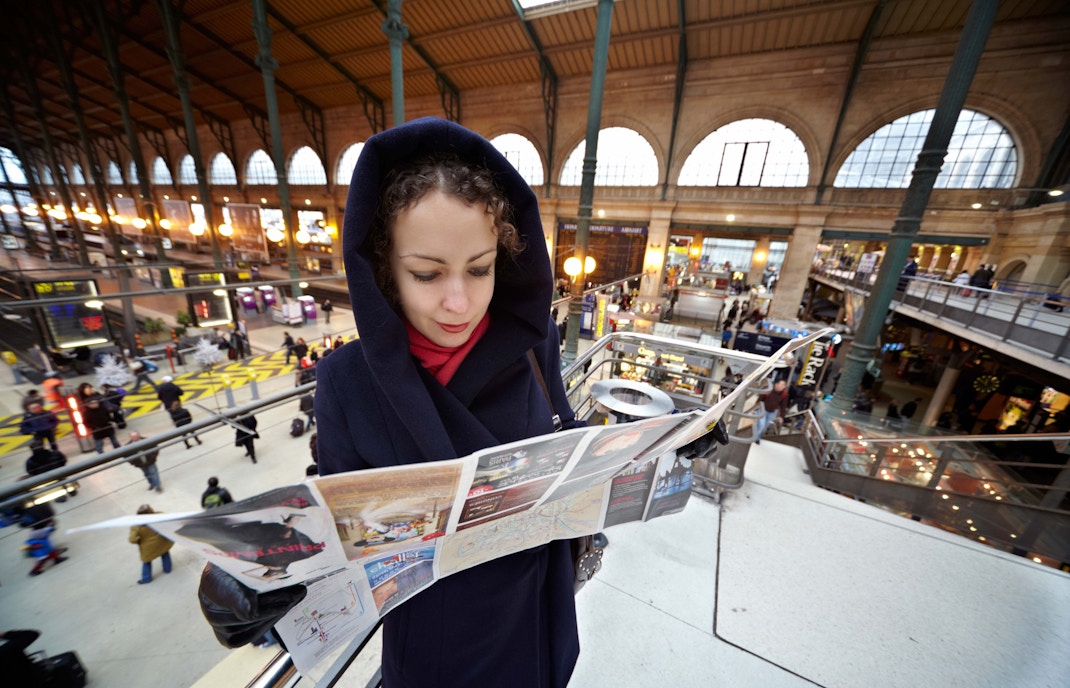
Do's
- Do get a carnet of 10 single-ride tickets instead of buying individual tickets for each ride, if you know you will be spending a few days in Paris and would be taking a few rides within the city. You will save some money this way.
- Do have a look at the public transport maps and get an idea of the various zones in Paris before buying your ticket or pass.
- Do ask at a ticketing counter for a map of the Paris public transportation system. They may not be freely displayed, but come in very handy while commuting, especially if you do not have one saved on your phone.
- Do look for free wifi spots while at the metro stations, train stations, and bus terminals.
- Do take care of your belongings while traveling using public transport in Paris as pickpocketing is very common.
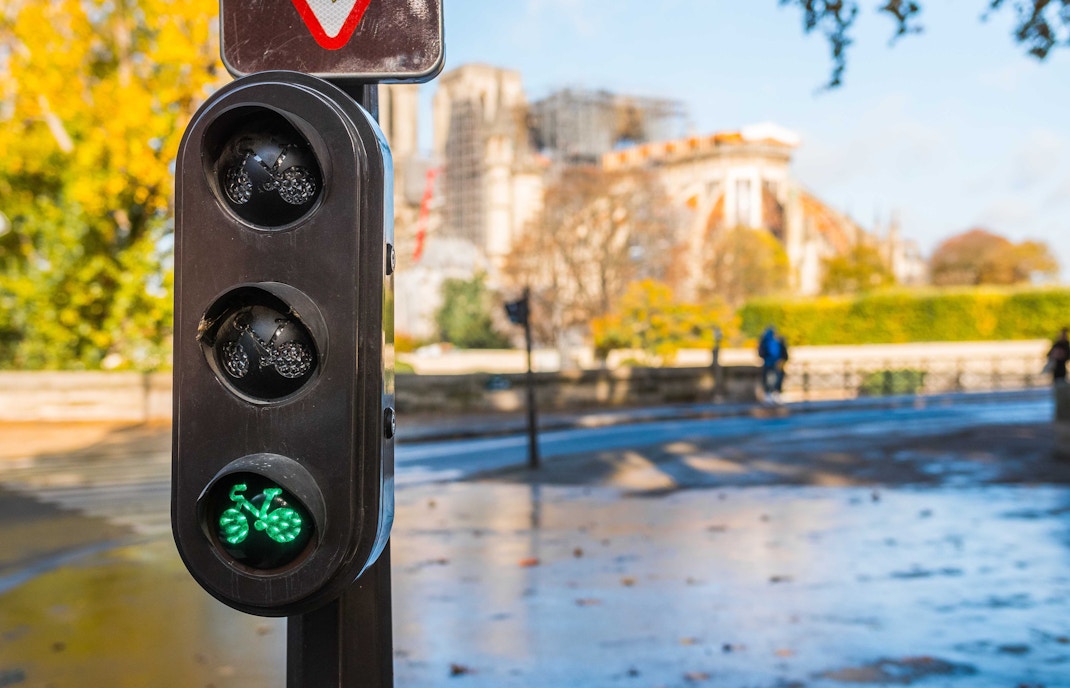
Don'ts
- Do not use public transport in Paris without a valid ticket. The fines are very high if you are caught traveling without a ticket.
- Do not throw away your ticket until you leave the station as you may require to show it to exit the station.
- Do not stand on the left-hand side of the escalator, as this side is used by commuters who are in a hurry, to run their way up or down.
- Do not forget to lock the bicycle correctly and swipe out of the system when returning rented Vélib' bikes.
- Do not buy the Navigo Découverte monthly travel card if visiting Paris after the second week of a month. It is better to get the weekly pass instead.
Frequently Asked Questions About Getting Around Paris
The best way to get around Paris is by using its well-connected network of public transport. The city offers many different options such as the metro, RER trains, Transilien trains, trams, buses, and taxis to get around the city. E-scooters and e-bikes are widely available for rent, to ride around Paris. You can also hire a car if you are older than 18 years and have a valid international driver's license.
The various modes of public transport available in Paris include the underground metro, RER suburban express trains, Transilien regional trains, trams, buses, and Noctilien or night buses - which are all operated by RATP (Régie Autonome des Transports Parisiens). There are also taxis, bicycles, e-scooters, and e-bikes available for hire.
Locals and tourists alike agree that the Paris metro is the safest mode of transportation in the city.
All modes of public transport run by RATP have an affordable standard rate of € 1.90 per journey. You can also buy a carnet of 10 tickets with a discount of 25% for € 14.90.
Public transport in Paris is generally safe, although one must be aware of pickpockets in crowded buses and trains. Make sure you always keep your bags with you and store your valuables in a safe place.
Most of the public transport in Paris like the metro, RER trains, Transilien trains, trams, and buses are safe for women and children. However, taxi cabs, especially at night, may not always be safe for women. You can download and use Heetch, a taxi booking app that operates from 8 p.m. to 6 a.m., aimed at helping people commute safely at night.
Taxis in Paris run with a meter that starts with a base fare of € 2.60 and a minimum service fee of € 7.10. From Monday to Saturday, the charge per kilometer is € 0.96 between 10 a.m. and 5 p.m. and € 1.17 after that. On Sundays between 7 a.m. and 12 a.m., the rate is € 1.21. On Sunday nights and public holidays, the rate per kilometer is € 1.47.
The Paris Metro is one of the fastest, cheapest, and most convenient modes of travel in the city. The tickets are affordably priced at € 1.90 per trip or € 14.90 for ten trips. There are also daily, monthly, and weekly travel passes that offer metro rides at discounted rates.
There are four different types of tickets or passes used by tourists for public transport in Paris. The T+ Ticket is a single-journey ticket with a validity of 90 minutes. The Paris Visite travel card is valid across three or five zones, for 1, 2, 3, or 5 days. Carte Mobilis is a one-day travel pass while daily, weekly and monthly travel passes are available with the Navigo Découverte travel card. All of these tickets are acceptable for all modes of public transport operated by RATP.
All types of tickets for public transport in Paris are available through vending machines and ticket counters at all metro stations, RER train stations, and airports. They can also be bought on board the vehicle at a slightly higher price. Some bus terminals, tourist information desks, and authorized retailers also sell public transport tickets and pass.
Most taxi drivers in Paris may not speak or understand English. You are therefore advised to carry a piece of paper with the address written on it or show the driver your destination on Google Maps.
Both Charles de Gaulle Airport and Orly Airport are connected to the city through public transport lines. You can choose to travel to and from these airports either by RER trains or buses. Taxis are also available at fixed rates for airport transfers.
All modes of public transport in Paris are accessible by people in wheelchairs. The metro line M14, 90% of the RER trains, and all of the public buses in Paris are made wheelchair friendly with automatic ramps, lifts, broad doors, and other facilities. You can find the map of all wheelchair-accessible lines of public transport in Paris here.
Although France is a free country without any restrictions on clothing, try to avoid wearing tight-fitting clothes and really short dresses, as Parisians tend to look down upon the showing of too much skin. Wearing casuals, smart casuals, and business attire will make you look less touristy and more local.
Some of the must-have travel apps in Paris are Paris Metro Map and Routes and Next Stop Paris – RATP for public transport convenience, Uber, Allocab, and Heetch for hiring a cab, Bird, Lime, and FREE NOW (Kapten) for renting e-scooters and e-bikes, CityMaps2Go for offline city maps, and Citymapper for finding the best routes and the most affordable means of public transport in Paris.








.jpg?auto=format&w=510.8727272727273&h=401.4&q=90&fit=crop&ar=14%3A11&crop=faces)
.jpg?auto=format&w=510.8727272727273&h=401.4&q=90&fit=crop&ar=14%3A11&crop=faces)
